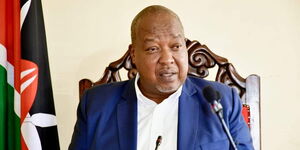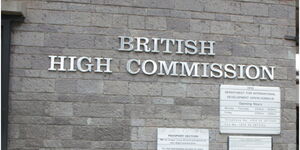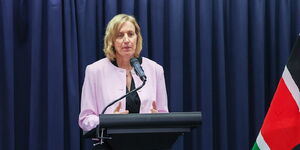Hours after President William Ruto criticised Justice Lawrence Mugambi over orders barring police from erecting roadblocks to stop protesters, the Judiciary now says the orders were misunderstood.
Through a statement on Thursday, the Judiciary said Justice Mugambi's orders did not stop the Inspector General of Police, Douglas Kanja, from erecting roadblocks but instead directed police to issue a prior notice before doing so.
Judiciary Spokesperson Paul Ndemo explained that the orders issued by Justice Lawrence Mugambi were meant to ensure transparency and protect public convenience during such operations.
“The order issued by the High Court did not bar the Inspector General of Police from barricading roads,” the statement read. “It only required him to issue a timely advisory or notice before any emergency barricading to allow citizens and members of the public to plan their activities accordingly.”
The orders stemmed from a petition that was brought forward by the Katiba Institute, which argued that under Article 23 of the Constitution, the police's actions amounted to an unlawful suspension of fundamental human rights.
The High Court on Wednesday issued conservatory orders to IG Kanja over the erection of roadblocks within the Nairobi Central Business District follo without proper notice.
A conservatory order is a temporary ruling given by the court to preserve the status quo while a case is being heard and determined.
In his ruling, Justice Mugambi stated that the police actions witnessed on Monday, July 7, infringed on constitutional rights such as freedom of movement, assembly, and peaceful protest under Articles 37 and 39 of the Constitution. The court directed that any future barricading must be preceded by a public advisory.
“That pending the hearing and determination of this application, a conservatory order is hereby issued restraining the first respondent—i.e., the Inspector General of Police—or any subordinate officer from mounting barricades or police roadblocks that block public access to Nairobi’s CBD or other roads without issuing timely notice,” ruled Justice Mugambi.
The case followed complaints from Nairobi residents who were blocked from accessing the city centre on Monday morning, with police roadblocks mounted at key intersections. The move caused major disruption for workers, businesses, and public service vehicles.
Closures were reported on major arteries, including Mombasa Road, Ngong Road, Thika Road, Lang'ata Road, Juja Road, and Valley Road, with civilians who were using the routes to go to work being forced back by authorities.
While the plan was to quell protests and destruction of property in the CBD for a third consecutive wave of protests initially worked, running battles between police officers and protesters spilt over to residential estates.












